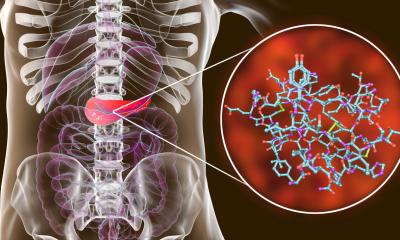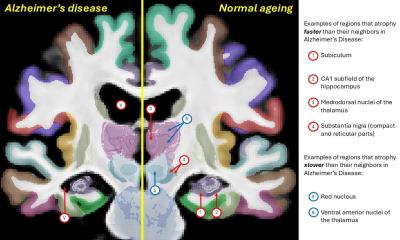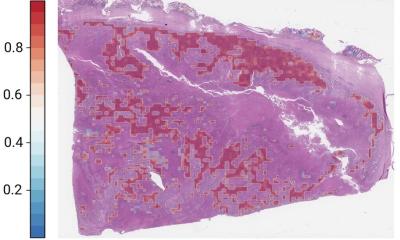
© andreaobzerova – stock.adobe.com
News • Public survey on medical conditions
Cancer seen as #1 health concern, AI as solution
Two-thirds of the public say they are very or somewhat worried about being told they have the disease – higher than for any other medical condition, including dementia and having a heart attack – according to new polling.
The survey, carried out among 2,000 UK adults by Public First on behalf of the University of Cambridge, highlights the concerns that people have over a cancer diagnosis. It suggests that late diagnosis – too late to treat their cancer – is the biggest concern in relation to a cancer diagnosis (70%) followed by the impact on one’s family and those around them (52%).
When asked which transformative development they would like to see in the future – including eradicating diseases such as malaria, self-driving cars becoming commonplace, and genetically engineered crops enabling us to end famine – 55% of respondents chose “being able to detect and treat cancer early enough so that no-one dies of the disease”. Only eliminating poverty came anywhere close, with 23% of respondents.
Outcomes can be completely transformed – better survival and less invasive treatments – if the cancer is diagnosed early enough. That’s why a lot of our focus now is on understanding cancer at its very earliest stage – years before an individual will develop any symptoms
Rebecca Fitzgerald
When asked what would concern them most about receiving a cancer diagnosis, the most commonly selected worry was that the cancer would be detected too late to treat (70%). 52% of respondents were concerned about the impact on their family or those around them, 41% about getting access to the right treatment, and 36% about the side-effects of treatments. Asked what would make them less afraid of being diagnosed with cancer, 61% replied “Knowing that the form of cancer I have is treatable”. Highlighting once again the importance of early detection, over half of respondents (51%) said "Knowing we are better at catching cancer early enough to treat".
"Outcomes can be completely transformed – better survival and less invasive treatments – if the cancer is diagnosed early enough. That’s why a lot of our focus now is on understanding cancer at its very earliest stage – years before an individual will develop any symptoms," says Professor Rebecca Fitzgerald, Director of the Li Ka Shing Early Cancer Institute. "That way, it may even be possible to prevent the disease in the first place, or at least catch it when it can be treated easily."
Knowledge about efforts in research towards better prevention, diagnosis and treatments of cancer is reassuring, the poll suggests. A third of respondents (32%) said this would make them less afraid of a cancer diagnosis. 43% of respondents believe cancer research at universities will have a big impact on reducing deaths from cancer (though perhaps unsurprisingly, 64% thought the biggest impact on reducing cancer deaths would come by reducing NHS waiting times).
The public were also asked their views on the use of artificial intelligence (AI) to improve diagnosis and treatment of cancer. An overwhelming majority were in favour of its application, with just 8% saying the technology shouldn’t be used for cancer diagnosis and treatment. 55% thought it was acceptable to use AI to speed up research into new treatments, 47% to help a doctor diagnose their cancer and 41% to help their doctor decide which treatment would work best.
We believe it’s possible to imagine a world where there is no longer a fear of cancer. It’s an ambitious goal that we – along with many other researchers around the world – are working hard to realise
Richard Gilbertson
At the University of Cambridge, scientists are developing AI tools with the potential to transform cancer treatments, by speeding up diagnosis, personalising therapy, and reducing costs. As part of this work, researchers are using AI to predict how patients will respond to a particular treatment before they receive it, allow them to start treatment sooner, target hard-to-treat cancers, and enable screening of cancers that at the moment would otherwise be prohibitively expensive.
When presented with a number of undesirable future events, a cancer diagnosis was second only to the death of a close relative in terms of being most worrying (64% verses 72%) – higher than nuclear war (56%), terrorism (53%) and being a victim of crime (52%). Surprisingly, older age groups were significantly less likely to say they were “very worried” about cancer compared to younger age groups – 14% of over 65s compared to 26% of 18-24 years olds and 29% of 25-34 year olds.
With the ongoing construction of the dedicated Cambridge Cancer Research Hospital, the University of Cambridge and its partner Cambridge University Hospitals NHS Foundation Trust (CUH) are hoping to address these concerns. The aim of the facility is to bring together world-leading scientists to detect cancer earlier and deliver personalised healthcare and precision cancer medicine to patients.
"Cancer affects one in two of us and understandably induces fear in patients and their families," says Professor Richard Gilbertson, Director of the Cancer Research UK Cambridge Centre. "People are worried that treatments won’t work or that the side-effects will be terrible, but also what their diagnosis will mean to their family. At Cambridge, we believe it’s possible to imagine a world where there is no longer a fear of cancer. It’s an ambitious goal that we – along with many other researchers around the world – are working hard to realise."
Source: University of Cambridge (text: Craig Brierley; CC BY 4.0)
19.07.2024





